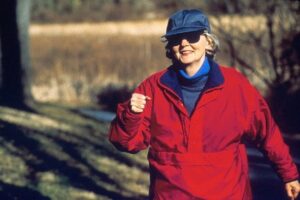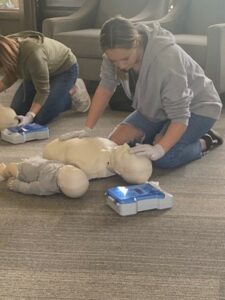Americans have more fatal heart attacks during the holiday season than any other time of the year. According to a study published in Circulation, the top three days during the year for heart attacks are December 25, December 26 and January 1.
WHY?
- Winter Weather: Regardless of where we live, researchers have found, we are more susceptible to heart attacks in the winter months, even if it is 72 and sunny in California. “A seasonal pattern to deaths from heart attack is well documented with more fatal events occurring in the winter in comparison to the summer,” says Oklahoma Heart Institute cardiologist, Dr. Eugene Ichinose.
 Excessive eating: Holiday food often has increased sodium, which increases blood pressure and forces your heart to work harder. Let’s face it, plenty of people tend to overeat during the holidays, when food is inviting and plentiful.
Excessive eating: Holiday food often has increased sodium, which increases blood pressure and forces your heart to work harder. Let’s face it, plenty of people tend to overeat during the holidays, when food is inviting and plentiful.- Too much alcohol consumption: Heavier alcohol consumption isn’t good for heart health, either.
- Emotional stresses: People without a strong support system can struggle with being alone during the holidays or the reminder of family members who’ve passed away. Depression and anxiety can have a negative effect on your heart.
- An increase in respiratory diseases: COVID, flu and cold viruses normally flourish during the winter months.
- Skipping medications: Travelers sometimes forget to pack their medications or face delays trying to get refills far from home.
WHAT YOU CAN DO
 Don’t Put off Medical Attention: Despite the big family gatherings, office parties and travel plans, if you are not feeling right, don’t wait until after the holidays to get it checked out. Know the signs of a heart attack and talk with your doctor immediately. Taking the right precautions early can help stop a heart attack in its tracks.
Don’t Put off Medical Attention: Despite the big family gatherings, office parties and travel plans, if you are not feeling right, don’t wait until after the holidays to get it checked out. Know the signs of a heart attack and talk with your doctor immediately. Taking the right precautions early can help stop a heart attack in its tracks.
If you have chest pain, don’t wait. Call 911. While worries around COVID-19 have caused some people to delay seeking health care, the smartest thing you can do when you experience heart attack symptoms is to seek immediate health care.
“Good surveillance is still important,” Dr. Kobina Wilmot said (a cardiologist at Novant Health Heart & Vascular Institute). “If you travel, for instance, take your blood pressure cuff with you. Make sure you have your diabetes monitor to know your blood-sugar levels. Take your medicines as you normally would. Make sure you have a connection, in advance, with a pharmacy wherever you’re going to be.”
Reduce Stress: With end of year events, projects at work, parties, shopping, and shorter days, we tend to feel rushed and stressed during this time of the year. Reduce your stress and help give your heart a break. Try not to overload yourself with multiple commitments.
 Practice relaxation techniques: Biofeedback and mindfulness mediation can help relieve stress.
Practice relaxation techniques: Biofeedback and mindfulness mediation can help relieve stress.
Try Not to Overindulge: Set a plan for yourself to enjoy the food and spirits, while not overindulging. Too much drinking, for example, can trigger atrial fibrillation, which can increase the risk for heart attack and stroke.
Ditch the Digging: While we benefit from regular exercise, extreme physical exertion like shoveling show can be bad for our hearts. If a big winter storm moves in, consider asking a neighbor or friend to help shovel your sidewalks and driveway. If you smoke, have a family history of coronary artery disease or have had a previous heart attack, it is best to leave the shoveling up to someone else.
Avoid Exposure to Cold Temperatures: Winter weather can be hard on the body, especially the heart. Cold temperatures cause arteries to tighten, which can restrict blood flow and reduce oxygen to the heart. While the heart is working harder to maintain body temperature, restricted blood flow and reduced oxygen to the heart can trigger a heart attack. Reduce exposure to cold temperatures outside and make sure the heat is on inside to help alleviate stress on your heart. Pile on the layers. Dress warmly indoors and outside.
 Wash Your Hands Frequently: Read the guidelines from the CDC on when to wash your hands, how to prevent the spread of germs and the 5 steps for washing your hands the best way.
Wash Your Hands Frequently: Read the guidelines from the CDC on when to wash your hands, how to prevent the spread of germs and the 5 steps for washing your hands the best way.
Continue Your Exercise Program: Even if you travel, try to work 15-30 minutes of movement into every day.
Keep Your Distance from the Fireplace: Smoke from the fireplace is a carcinogenic like the smoke a cigarette. Studies have found the fine particles from the smoke can go deep into the lungs and increase the risk for heart attack and stroke.
Brush Up on CPR skills: Protect yourself, family and friends by refreshing your CPR knowledge. If someone needs help, you want to be able to provide fast, accurate care until the professionals arrive.



Leave a Reply